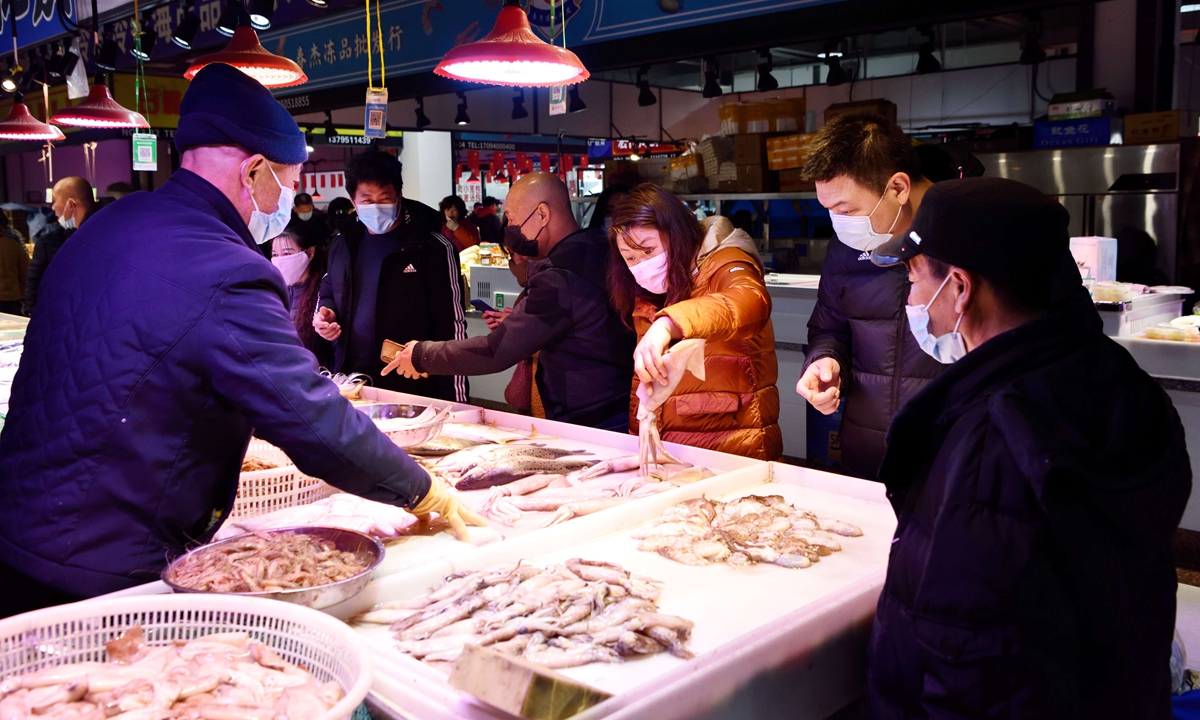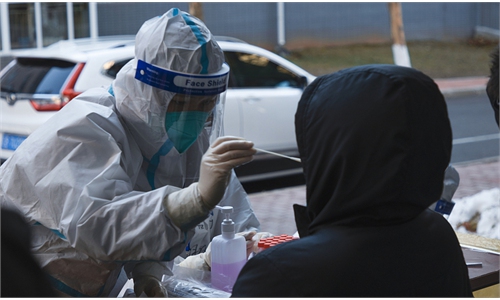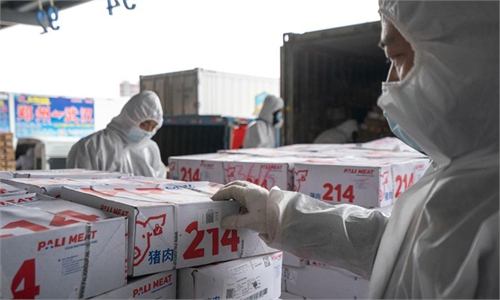Port city Dalian hit hard by 3rd round of cold-chain related outbreaks, facing higher infection risk in winter

People buy seafood at a large wholesale market on January 30, 2021 in Dalian, Northeast China's Liaoning Province. Photo: VCG
Dalian, one of China's largest port cities for cold-chain aquatic products import in Northeast China's Liaoning Province, has been hit hard by a cold-chain related outbreak for the third time due to the large volume of container shipping as well as loopholes in its daily epidemic management system.
Starting from a staffer at a facility called the designated first-stop cold storage area, this round of COVID-19 infections has spread locally within companies, families and schools in Dalian. In less than ten days, the port city's tally reached 289, of which 235 were confirmed cases and 54 were asymptomatic ones as of Saturday, local health authority announced on Sunday.
The viral load detected in the outbreak is high, the transmission speed is fast and the generational transmission duration is short. The cases are mainly concentrated in two food companies and universities, Zhao Lian, deputy head of the Dalian's health commission, said at a press conference on Sunday.
Dalian is one of the largest ports for cold-chain aquatic product imports in China, and the volume of aquatic products, aquatic product bulk cargo shipments and aquatic product re-exports all rank first among ports in China. Nearly 70 percent of imported cold-chain goods enter China through the Dalian port. Media reports said that about one-third of China's cold-chain products are stored in Dalian, or about 400,000 tons, ranking first.
The city suspended the operation of all imported cold-chain food-related companies on November 8, according to previous reports.
Previously, there were two rounds of cold-chain related outbreaks in Dalian. In July 2020, an outbreak was suspected to have originated in the processing workshop of Kaiyang Seafood Company. Five months later, the first infected people of an outbreak in the Dalian Jinpu New Area were handlers of imported cold-chain food.
It is particularly hard for Dalian to eradicate the coronavirus there, as the virus has proven to be the hardiest among all respiratory infectious diseases in cold-chain environments, Wang Guangfa, a respiratory expert at Peking University First Hospital, told the Global Times on Sunday.
However, by adopting proper measures, the impact of COVID-19 infections in such ports can be held to the minimum, Wang said.
Dalian built seven designated first-stop cold storage facilities in early 2021 that are responsible for disinfecting and testing all cold-chain products arriving in the city. However, loopholes still seem to exist. For example, staff at those facilities should have undergone closed-loop management in their daily work, and epidemiological studies showed some infected workers had lived in their dormitories but some lived at their own homes in communities, including the first reported case who was a 52-year-old employee of a cold-chain warehouse in Zhuanghe, a city administered by Dalian, who lived with his wife and mother.
A Beijing-based immunology expert told the Global Times on Sunday on condition of anonymity that the anti-epidemic management system should be adjusted according to the season as the virus can exist for a longer time and people's respiratory tracts are more vulnerable in winter than summer.
The interval of routine nucleic acid tests should also be shortened from seven days to two days as the time of intergenerational transmission has been discovered to be shortened to two days in this round of outbreaks in Dalian, the expert said.
Chinese epidemiological analysts pointed out that China is adopting the dynamic zero-case policy rather than bringing infections to zero in the era of normalized epidemic prevention and control. But the policy has been loosely or wrongly implemented in some places as previous outbreaks showed that enhanced supervision over sporadic cases and earlier preparations for potential outbreaks are more necessary.
Some standards for epidemic control work should be set, personnel and items should be separated to manage, and strict disinfection should be conducted, they suggested.
The dynamic zero-case policy is meant to prevent viral transmission in communities and to find and treat patients as soon as possible, said Liang Wannian, head of the experts' panel on COVID-19 responses of China's National Health Commission.
It depends on the overall international conditions of the COVID-19 pandemic to decide whether to change the current dynamic zero-case policy for China. Besides, the emergence of new variants, the disease severity and China's vaccination rate would also be considered in adjusting anti-pandemic measures, according to Liang.


